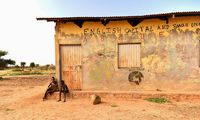UNESCO Warns of Crisis in Education

In a press release from September 2017, UNESCO cites recent data to warn that 617 million children and school-age adolescents worldwide do not possess basic reading and arithmetic skills.
This figure represents 56 per cent of primary school children (6–11 years old) and 61 per cent of adolescents (12–14 years old). Especially precarious is the situation in Sub-Saharan Africa (88 per cent of all children and adolescents), as well as Central and South Asia (81 per cent).
Inadequate Quality of Education
Two-thirds of these children without basic reading and arithmetic skills do go to school, the data shows, but the schools are often qualitatively inadequate. Based on the data collected, UNESCO was able to identify three main reasons for the gaps in knowledge: Either the children do not attend school at all, or they fail to complete compulsory education, or the quality of education is too poor to convey basic reading and arithmetic skills.
Education Agenda 2030
In September 2015, the community of states committed itself to ensuring inclusive, equitable quality education for all young people by 2030. UNESCO is tasked with coordinating this Global Education Agenda 2030 for the United Nations. With its eAtlas for Education 2030, UNESCO provides statistical data from all over the world to help implement the Education Agenda 2030. Interested parties can use targeted inquiries to access selected datasets in the form of Excel spreadsheets and maps. For gender-related statistics, for example on participation in all areas of education or on literacy rates, UNESCO has compiled the eAtlas for Gender Inequality in Education.
Editorial staff (mm)
Sources
Phtoto credit: Hamar Tribal School by Rod Waddington / CC BY-SA 2.0
Information source (German only): UNESCO press release 21 September 2017